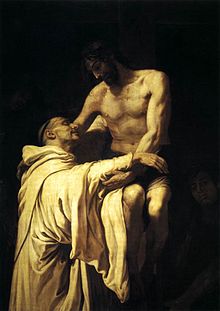Today is the memorial of Saint Bernard of Clairvaux (1190 – 1153), named after the ‘clear valley’ in which he helped establish a Cistercian monastery, itself named after the Citeaux monastery, near Dijon in France, where, in 1098, Robert of Molesme and Stephen Harding set up their own community to live more strictly the sixth-century rule of Saint Benedict.
Bernard was seen as the ‘second founder’ of what would be called the Cistercians, when, after a strong call from God while at prayer, he showed up with thirty companions at the debilitated monastery at Clairvaux in 1113, reviving the community to glory, and was soon elected its most famous abbot.
A strong, charismatic figure, with evident intellectual gifts, Bernard, wrote much on the spiritual life in his melodic Latin prose, and was declared the sixteenth of thirty six doctors of the Church during the brief pontificate of Pius VIII in 1830. Pope Pius XII wrote an encyclical on Bernard, under his title of the Mellifluus Doctor, in which he described the Cistercian monk as the ‘last of the Fathers’.
Although naturally of a retiring disposition and a deep contemplative, Bernard’s great talents were soon discovered, and he was involved in much of the ecclesial and political events of his time, from preaching the second Crusade in 1146, with enthusiasm waning after the difficulties of the First in 1095, to finally take back the Holy Land from the marauding Muslims (and they did begin as defensive wars); he also helped heal schisms in the church, and wrote against the early ‘liberal’ theologian Peter Abelard, debunking his modernist (if that is not an anachronism) theories (yes, the same Abelard who got in all that romantic trouble with the beautiful Eloise; but both died reconciled to the Church).
Carl Sundell has a vivid apologia, recounting the oft-forgotten religious principles motivating some of the great presidents of the United States. Yes, I know this is a Canadian magazine, but we can learn much from our neighbours to the south, not least that immersion in one’s national history helps one, as the adage goes, to avoid the mistakes of the past, while continuing and improving upon the valuable aspects of their legacy. Americans seem much more aware of what came before (how many young Canadians know anything about our own history, I often wonder, especially its more Catholic elements).
Alas, even in the land of the free, knowledge of their history is diminishing. Like us, there is a wave of modern ignorant and violent iconoclasts trying to erase the past, taking down, defacing or demolishing statues and monuments, and re-writing textbooks and articles, a la Orwell’s prescient dystopia 1984. History is whatever the zeitgeist of the moment says it is, a passing fancy of political correctness.
The past is not perfect, but neither are we, in many ways less so than those who came before; we can only become more virtuous, as persons and as societies, by learning from our forefathers, spiritually, but also politically.
Sancte Bernarde, ora pro nobis!


